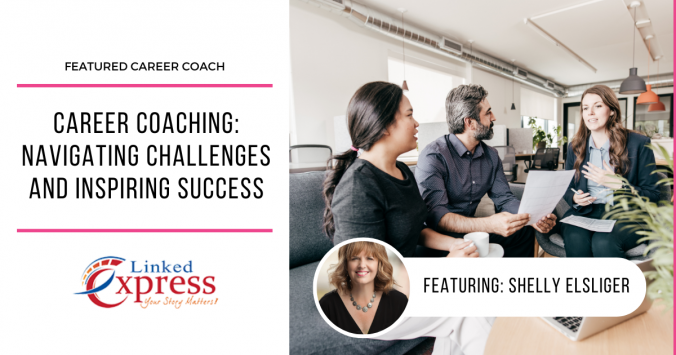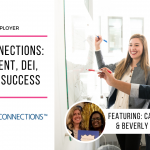TalentEgg had the privilege of interviewing Shelly Elsliger, a seasoned Career Consultant/Coach. She has a rich background of 20 years in higher education career coaching at renowned university business schools like John Molson School of Business at Concordia University and Rotman Commerce at the University of Toronto. DEI is an integral part of all her endeavours. When working with students, she diligently prepares them for interviews and addresses DEI-related inquiries.
Shelly’s Career Inspiration
We were curious to know what inspired Shelly to pursue career education, to which she responded, “I think Career Coaching found me.” She states how she checked out a local Youth Employment Services Center in Montreal during her early twenties. She spoke to the director and felt an immediate connection, promptly asking for mentorship. Her wish was granted, and she shadowed the director for months, quickly realizing she had found her passion and never looked back.
Shelly told us, “I find it a rewarding career that constantly changes and challenges me. I am always looking for ways to challenge students, build their confidence, and help them explore and find ways to design their career development process. I never just settle and always believe that there is always more I can do as a Career Coach.”
Shelly’s Greatest Achievements
When asked about her most significant achievements in her career, Shelly answered, “My greatest achievement must be my ability to help students understand professional branding .” She explained how many students face imposter syndrome, self-doubt, and FOMO to the point where they feel they can’t progress in their careers.
She harnesses her extensive knowledge in this field, offering valuable guidance to students. Shelly enables them to grasp the mechanics of LinkedIn algorithms and effectively construct their narratives as practical tools for in-person and online networking. When she sees that her work helps students transform and achieve this (she calls it an Oprah Ah-ha moment), it makes her “heart and soul full.”
Diversity, Equity and Inclusion Among Students’ And New Grads’
As mentioned prior, DEI is a significant aspect of Shelly’s work. She touches on her qualifications and values, “I am certified in Leadership and Inclusion. When it comes to serving students, I place an important goal on making each coaching, workshop, or event experience as inclusive as I can. I have never been someone who treats students with a “buffet” style approach. I get to know students at a deeper level and always try to build their confidence and their sense of belonging.” Shelly adds that each student she interacts with is different from the last. She must wear a “different hat” for each student.
Shelly’s diverse “hat collection” enhances her readiness to support students from various cultures and backgrounds. “I hope to model an important lesson for students: an understanding that fostering inclusive behaviours will help them be better in terms of individual, team, and organizational contributions when they move from the world of school to the world of work,” she concludes.
Mental Health Among Students’ And New Grads’
We wondered how mental health factors into what Shelly does. “Everyone has a story we know nothing about. I always keep that in mind when working with students. Knowing the signs and doing something about it is so important in the work I do. I got certified in Mental Health CPR from the Mental Health Commission of Canada and LivingWorks Applied Suicide Intervention Skills Training (ASIST) so I can know the signs and lessen the barriers that exist,” she explains.
Shelly mentions that she provides a safe space for students, who can depend on her if they need help or just someone to talk to. She expands further, stating, “in some cases, a conversation and safe place to come is not enough. In some cases, students are experiencing thoughts of suicide, and it is part of my role to make sure they have the right resources available.”
Successfully Transitioning Students from School-to-Work
As a primary focus of her position, we asked Shelly how she helps students transition from school to the workplace, especially in the post-pandemic digital age. She responded, “There is still the catch-22 when it comes to experience, so incorporating different programs and offerings on campus to simulate real-world situations and build skills is important. I am a big believer that diverse experiences can help students grow in diverse ways. Students often lack confidence and confidence is key.” Shelly states it is important to stay outside the box when assisting in this area with services like workshops, guest speakers, coaching sessions, and more.
Students’ Biggest Pain Points
Shelly was kind enough to provide insights on the most considerable pain points her students often encounter in a job search in 2023. She highlighted eight:
- Branding and standing out for recruitment
- Interview tips and practice
- Job search and where to find diverse opportunities
- Navigating job search as an international student and what employers are open to hiring international students
- Lack of work experience
- The competitive and changing job market
- Knowing what jobs match their academic background
- Their approach to building relationships and approaching decision-makers
Shelly mentions that the prominence of technology has transformed the recruitment landscape, introducing ambiguity and a sense of unpreparedness due to constant change. This shift has heightened the need to anticipate the unexpected, creating a heightened sense of urgency. She adds that students perceive how technology poses new challenges. Previously, creating an attractive resume was difficult enough. Now, insecurity and frustration arise as they wonder if their resume will navigate the ATS pipeline and reach recruiters. “There is definitely an increased feeling of not ‘being enough’ or ‘having enough’ and this constant message and nagging of keeping up in terms of skill demands and expectations,” Shelly closes.
How Employers Can Support Young Talent
Shelly shared her advice for employers on better supporting their student personnel. She advises employers to highlight expectations clearly; there should be no ambiguity. A thorough onboarding process is another suggestion, as well as ensuring students are accommodated for whatever they may need in their position. Furthermore, transparency, training, and collaboration are keywords she underscores as essential for employers to focus on when supporting students in the workplace.
How Employers Can Connect with Top Students
We were curious to know Shelly’s thoughts on the best ways for employers to connect with students. She mentions an on-campus presence is crucial. “This is a way to be involved in something unique and a way to stand out. My only suggestion is to put some thought and consideration into what you will do and how you will do it. Students want to show you what they have, and they want to know your ‘WHY,'” she explains. Employers must tap into what students are looking for and make themselves memorable. Info Sessions, workshops, and case competitions are all great ways to have a campus presence. She adds that free merch and food won’t cut it. Make your company feel meaningful, and do not waste the student’s time. Make a lasting impression.
Advice for Fellow Career Educators
We asked Shelly for advice she has for other career educators who are getting started in the field, as well as some guidance for the post-pandemic era. She provided five tips for career educators who are starting out:
- Take a coaching certificate; it will change the way you interact with students, support dialogue, and build trust
- Take time to figure out the lay of the land and set up times to meet people to gather perspective. Make sure to meet people beyond who you will directly be working with daily but the important folk involved in the student journey
- Be open to collaboration. Great things happen when diverse stakeholders work to create learning experiences
- Ensure that diversity, equity, and inclusion are the foundation of all you do so that every student feels like they belong
- Build your resource library so you always have more to offer
She adds five tips for career educators in the post-pandemic landscape:
- Understand that things are different and accept that adapting will take time.
- Prepare to see some new graduates or even older alums return for career help due to layoffs, especially in tech
- Commit to understanding the new way of doing things and be up to date on trends like; recruitment strategies, the gig economy, the importance of networking, applicant tracking systems and resume development, virtual interviewing and virtual recruitment, micro-certifications, and ChatGPT to name a few
- Make sure you know where students can go for the right resources in case they need additional support in other areas, for example, mental health resources on campus
- Give students the opportunity and the space to explore and “develop many possible career selves” and provide support and insight into new career options
Conclusion
Shelly concluded our discussion by sharing her “quote of the day.” She mentioned that she has an “inspiration board” that always includes inspirational quotes for students. She stated that students had told her that her quotes had provided affirmation for them when they needed it most. She shared her quote with us from Thomas Edison, who stated, “If we all did the things we are capable of, we would literally astound ourselves.”
Shelly Elsliger has been a Career Coach for more than 20 years. She has worked at both John Molson School of Business (Concordia University) and Rotman Commerce (University of Toronto). Currently, Shelly is a Consultant who now operates her own business, Linked-Express and is also a Senior Career, Leadership, and Inclusion Coach for CareerJoy.





